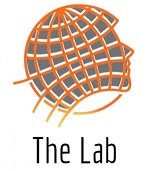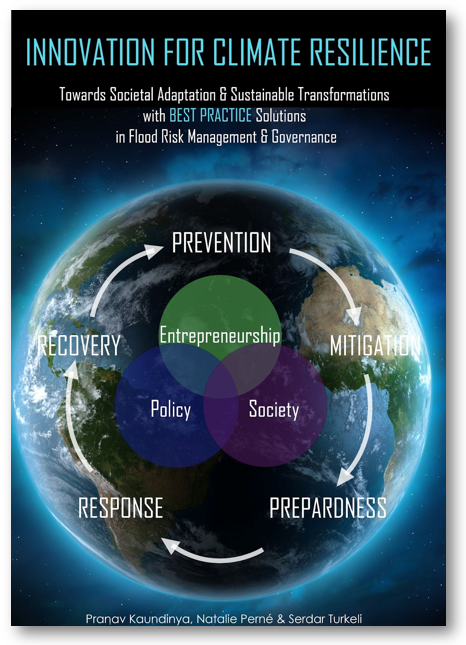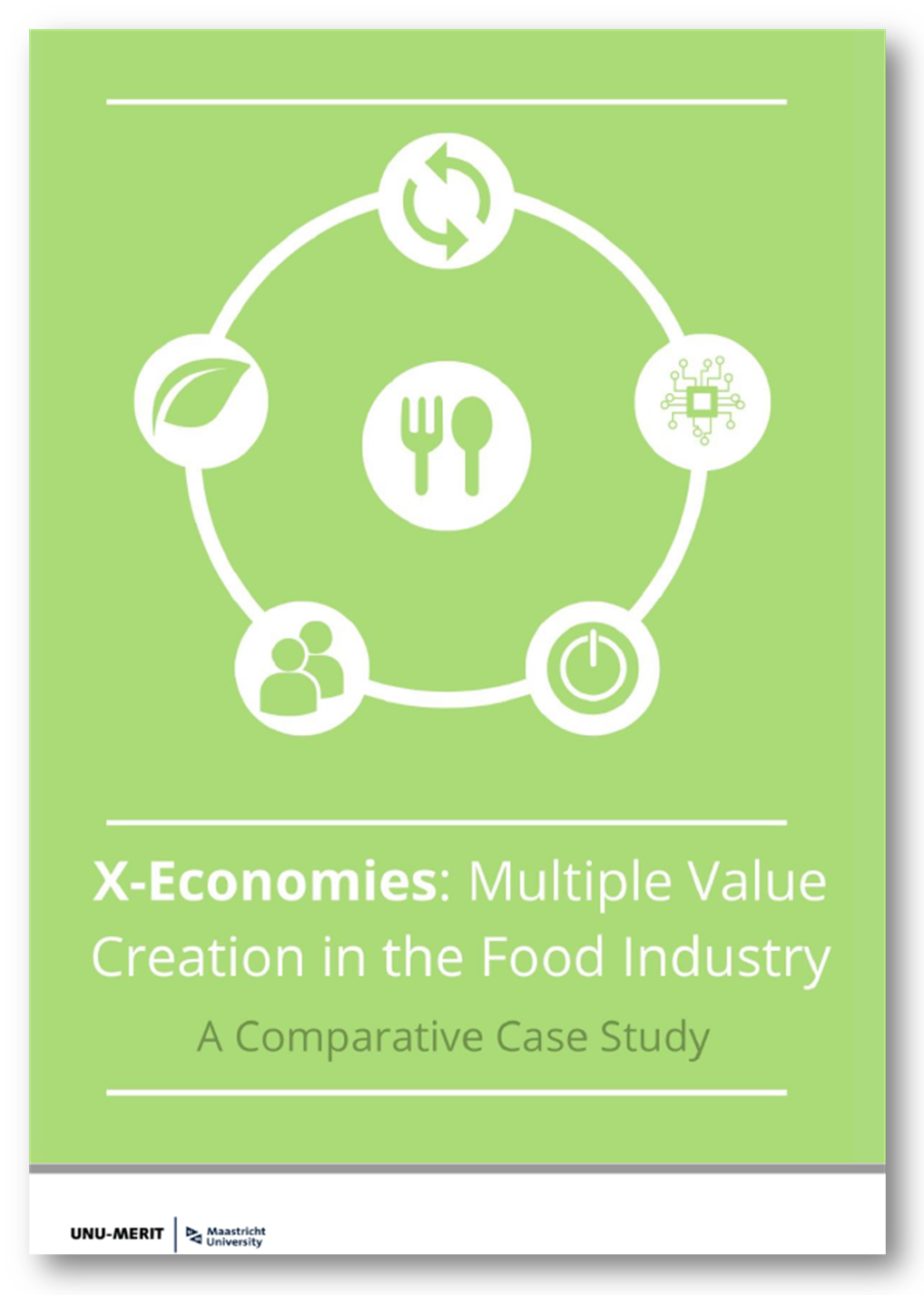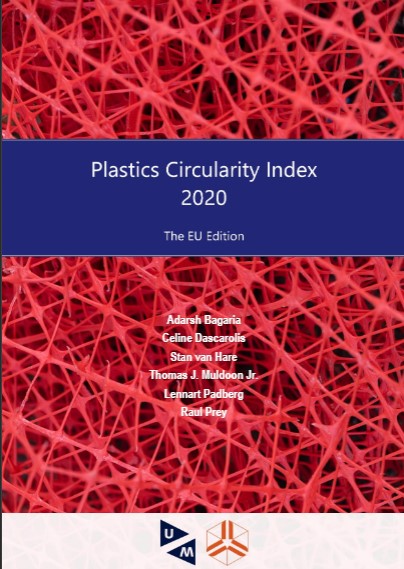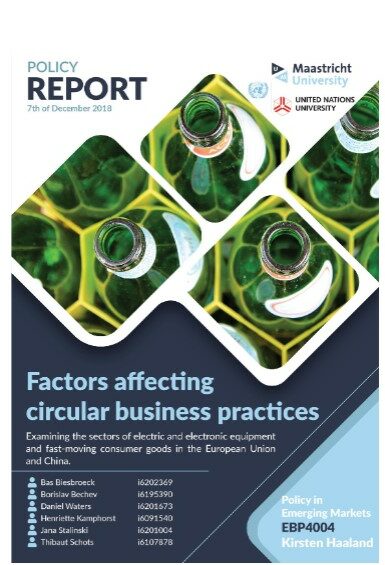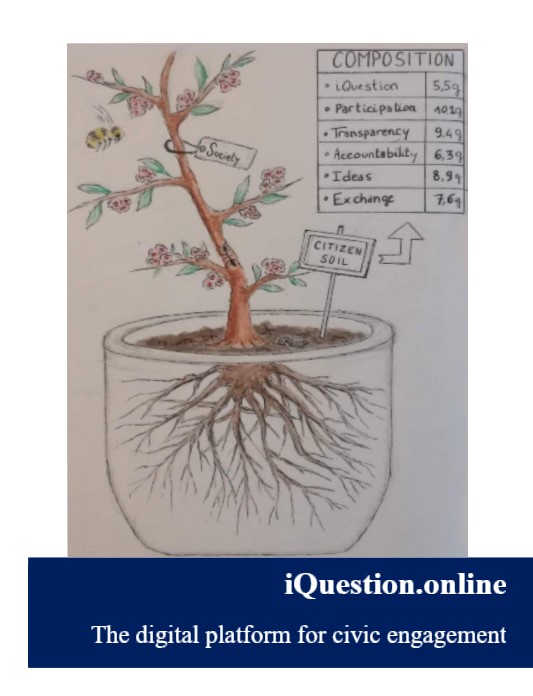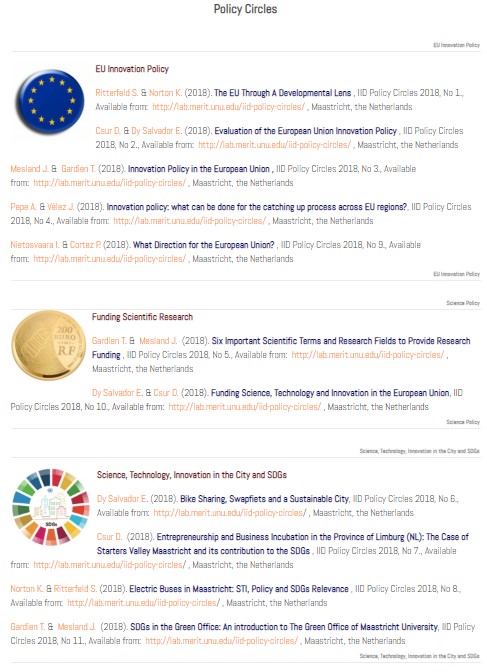Publications
Maastricht Manual on Measuring Eco-innovation for a Green Economy
Maastricht Manual on Measuring Eco-innovation for a Green Economy
Citation:
Kemp, René, Anthony Arundel, Christian Rammer, Michal Miedzinski, Carlos Tapia, Nicolò Barbieri, Serdar Türkeli, Andrea M. Bassi, Massimiliano Mazzanti, Donald Chapman, Fernando J. Díaz López and Will McDowall (2019), Maastricht Manual on Measuring Eco-Innovation for a Green Economy, Maastricht.
More info: Maastricht Manual for Measuring Eco-innovation for a Green Economy published (inno4sd.net)
Measuring Eco-innovation
Download:
MEI D1 Eco-innovation from an innovation dynamics perspective
MEI D2 Typology of eco-innovation
Final report MEI project about measuring eco-innovation
Research and Education (R&E) Integrated Training reports:
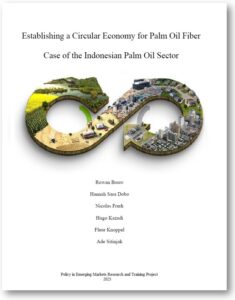 Policy Project – Establishing a Circular Economy for Palm Oil Fiber
Policy Project – Establishing a Circular Economy for Palm Oil Fiber
This study aims to recommend policymakers on the establishment of a circular economy in the Indonesian palm oil industry, more specifically for palm oil fiber waste. Despite the industry’s crucial role in the country’s economy, concerns over deforestation and sustainability have led to regulatory interventions, posing a dilemma for policymakers. The research proposes an alternative approach, leveraging circular economy principles and the Multi-Level Perspective framework, to transform palm oil waste, particularly fiber waste, into value-adding circular products.
Technological change and innovation are increasingly seen as being able to provide solutions to addressing flood risks and fatalities caused by accelerating climate change. Yet, associated stakeholders face divergent challenges: 1) Stakeholders tend to act in isolation creating silos in flood risk management and governance; 2) Public sector is challenged in moving forward with flood prevention and single-purpose solutions; 3) Citizens are still waiting to be connected to the flood risk management domain and facilitated to contribute; and 4) Entrepreneurs with potentially useful ideas need experimenting with the possibility of multiple value creation that stems from multi-stakeholder collaborations.
Navigating UM’s Network of Sustainability Actors
This MaRBLe research team was commissioned by the Climate Innovation Hub (CIH) based at the Lab of the United Nations University MERIT to investigate Maastricht University’s (UM) role in the network of sustainable actors in achieving the UN SDGs in a local context. More specifically, the researchers were asked to examine how UM improves overall sustainability and how a Social Network Analysis (SNA) can contribute to understanding the needs for effective collaboration among sustainable actors in Maastricht.
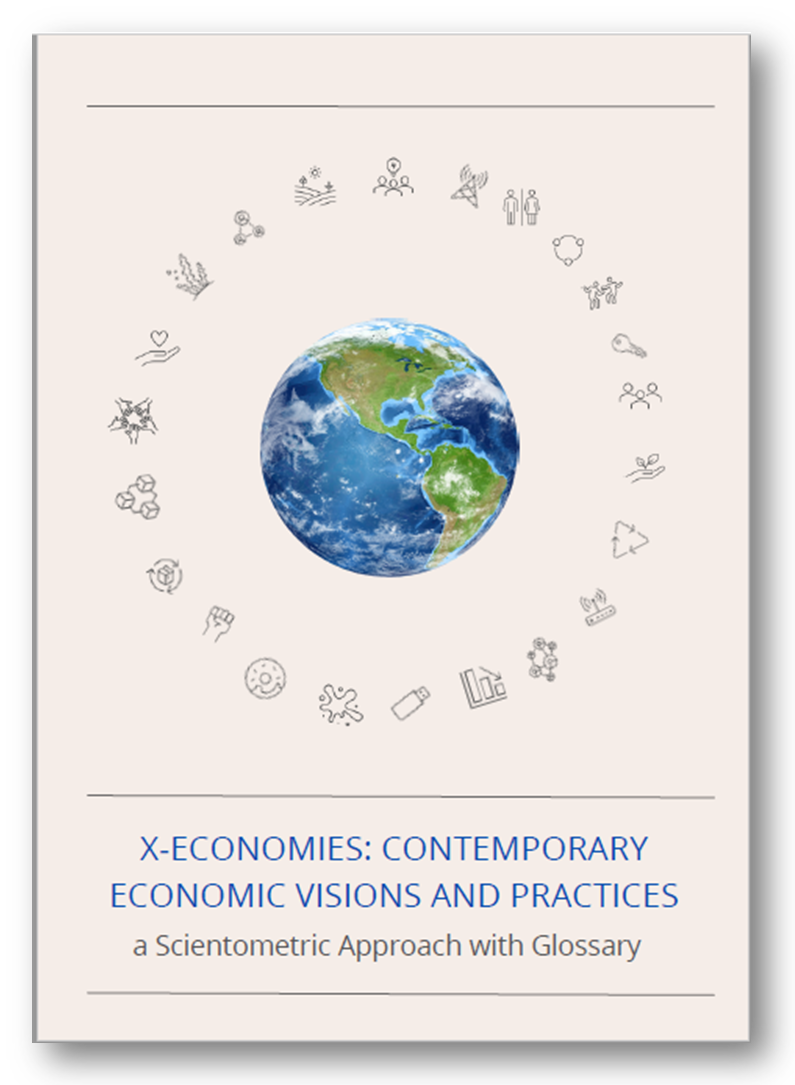 X Economies: Contemporary Economic Visions and Practices, a Scientometric Approach with Glossary
X Economies: Contemporary Economic Visions and Practices, a Scientometric Approach with Glossary
The report aims to clarify existing X-economies and to investigate potential research gaps, which academics or entrepreneurs must fill to promote X-Economies’ vision of an alternative economic reality. Therefore, it aims to answer the following research question: Through which combined actions could researchers and entrepreneurs most likely overcome innovation burdens, replacing the current economic regime with X- Economies?
X Economies: Multiple Value Creation in the Food Industry
X-economies are alternative economic models that have emerged in response to our unsustainable consumption habits which have resulted in resource depletion and climate change, among other pressing issues. These alternative models aim for more sustainable and resilient economies by addressing and changing unsustainable consumption patterns as well as managing resources more responsibly. The need to change unsustainable consumption habits is predominant in the food sector as food systems have a huge environmental footprint and are responsible for a large share of greenhouse gas emissions. Therefore, our current food system must change immediately and rapidly. Too Good To Go, De Clique, and AeroFarms are three food businesses that integrate different X-economies, namely the circular, green, social, digital, and data economy, thereby advancing the sustainability of the food sector and creating multiple value for the environment, society, and economy. It is key to adopt and integrate X-economies in more and more businesses and corporations within the food sector and beyond to move towards a more sustainable future.
X Economies – Pathways towards a more resilient and sustainable world
We witness a proliferation of various economy visions and practices from A to Z (e.g. access economy, bio-economy, blue economy, circular economy, collaborative, digital economy,…, sharing economy, social economy , youth economy, zero-waste economy…). All of these “X economies” are scientifically studied and proposed as fixes to various shortcomings of the current economic model with respect to resilience, sustainability, responsibility parameters. Yet, we have limited knowledge (of the big picture (macro) with fine grained details (micro) on how these various economies evolve and interact with each other in different contexts (e.g. in the EU and in Emerging Markets, other major world regions such as Latin America, Sub-Saharan Africa).
Innovation for Sustainability – Volume 1 | 2020
The first run of Innovation for Sustainability class at Maastricht Graduate School of Governance is over. The course is the final course of Governance of Innovation specialisation track of Master of Science in Public Policy and Human Development programme at Maastricht Graduate School of Governance and UNU-MERIT. We think that this first volume of open access digital compilation of “Innovation for Sustainability” e-book will inform and inspire many people around the globe, as well as the next cohort, about the need for innovation for sustainability. In this book, you can read about various sustainability issues and solution approaches.
Editing: I4S e-book
Calls for Change – Volume 2 | 2020
A much needed global societal transition towards alternative settings calls for a comprehensive understanding and the analysis of the forms and functioning of various multi-scalar socio-technical systems and transitions. Accelerating the evolutionary scientific, technological, social and environmental sustainability transitions towards alternative societal futures require a holistic, interdisciplinary and critical know-how. In this book, you can read about various sustainability issues and solution approaches.
Plastics Circularity Index (PCI) – The EU Edition – addresses how EU countries perform relative to each other in their circular management of plastics and related waste products. A circular economy, encompassing plastics, is extensive and entails several actors. Therefore, PCI analyses actions undertaken by governments, businesses and consumers that stimulate the circular usage of plastics. PCI – EU Edition covers each stakeholder category with a comprehensive collection of indicators to gain an extensive view of the state of circularity in EU countries. In addition to the indicators per actor category, the index also considers country profiles on plastics and circularity. The respective PCI indicators and methodology are explained in more detail in PCI 2020 EU Edition full report.
What factors and policies are promoting private sector circular economy practices in the sectors of consumer electric and electronic equipment (EEE) and Fast Moving Consumer Goods (FMCGs) in Europe and China?
A. What policies are in place to promote the circular economy (CE) in Europe and China?
B. Based on the literature, what factors (country and market specific) contribute most to the promotion of private circular initiatives?
C. What are the effects of factors and policies on the circularity of companies in China and Europe?
D. What policies should be implemented to encourage private circular initiatives in
the sectors of EEE and FMCG’s in Europe and China?
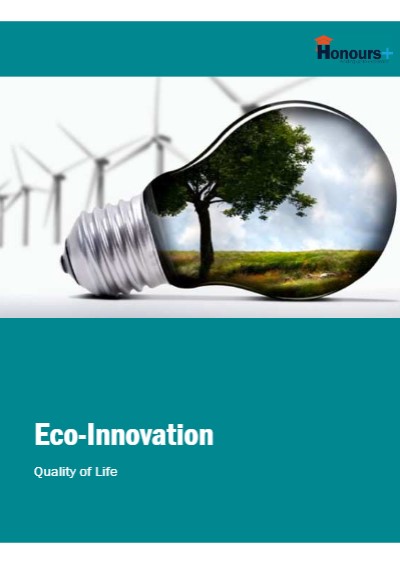 Eco-Innovation and Quality of Life: Eco-Villages
Eco-Innovation and Quality of Life: Eco-Villages
To what extent does eco-innovation contribute to quality of life, positive peace and happiness?
Ecovillages have a holistic approach to the concept of sustainable development that englobes social, economic and environmental effects of eco-innovation. As communities, ecovillages are constantly looking at ways to diminish their ecological footprint and develop more inclusive social structures. Their high level of eco-innovation makes them particularly suited for an evidence-based model of sustainability.
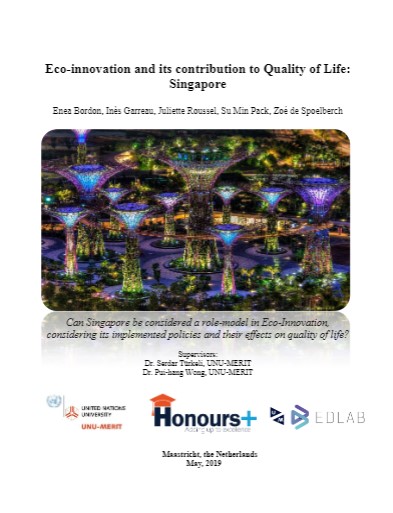 Eco-Innovation and Quality of Life: Singapore
Eco-Innovation and Quality of Life: Singapore
In a time of unrestrained technological shifts, threats caused by climate change and widespread socio-economic crises, there is still a promising solution to help generate economic and social prosperity while safeguarding our planet and the well-being of its citizens: eco-innovation. Eco-innovation is a dynamic process which can result from the activities of manifold players, ranging from governmental authorities to organizations and even private individuals. This paper examines the correlation between eco-innovation and its active contribution to the quality of life by presenting a practical case -study on the city -state of Singapore. The win-win narrative characterizing eco-innovation represents the underlying theme of the research, which ultimately aims at emphasizing the need for states to prioritize eco-innovative solutions in order to secure the future well-being of their citizens and of the environment. The case study at hand focuses primarily on the interventions of the Singaporean government in four specific policy domains, namely: solar energy, water, land use and transport.
Digital Platform for Civic Engagement – iQuestion
Digitalization is increasingly transforming societal, political, and economic interactions. The digital platform iQuestion.online is proposed as a solution to the democratic deficit; the decrease in government and institution transparency and accountability, and diminishing citizen engagement in representative democracies. This MaRBLe provides findings based on a qualitative meta-synthesis. The team makes recommendations on the iQuestion.online platform; its functionalities, its design, and infrastructural elements, and the iQuestion.online organization, an implementation analysis, a financial needs assessment, and a revenue model. Practical implementations have been initiated on the digital platform and are subject to further realization.
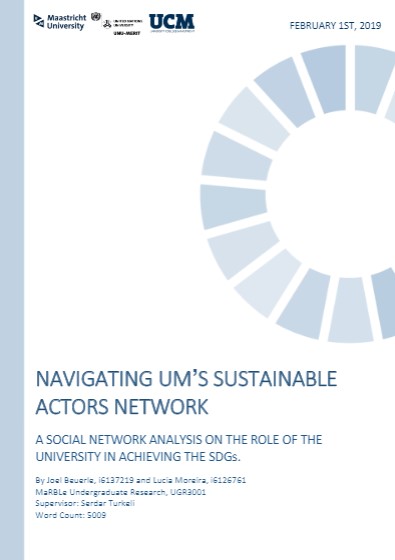 SDGs Actors Network – Maastricht
SDGs Actors Network – Maastricht
There are several models that propose how a university can work on the Sustainable Development Goals (SDGs). We looked at these models and, using Social Network Analysis, modelled the network of sustainability actors in the city of Maastricht. By calculating selected network metrics , we helped shine light on who the most influential actors are and what the role of the university is in reaching the SDGs. At the end we present a list of recommendations to the university and civil society actors to work towards the SDGs more effectively and to make use of the network as a collaborating platform for actors in the city of Maastricht.
The Maastricht Graduate School of Governance (MGSoG) of Maastricht University is integrated within The United Nations University – Maastricht Economic and social Research Institute on Innovation and Technology (UNU-MERIT). The School covers all aspects of governance in domestic and global organisations, from policy analysis to policy design and evaluation.
Updated on [14.12.2023]
